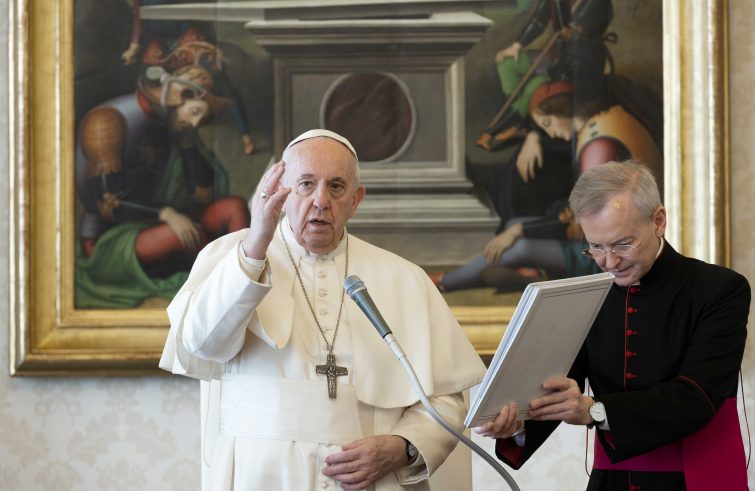
“The defence of life for the Church is not an ideology, it is a human reality that involves all Christians”, for “every human life is unique and of incalculable worth.” After 25 years the Pope highlighted the topical relevance of the teachings contained in the Encyclical Evangelium Vitae of Saint John Paul II, at the centre of the catechesis of today’s general audience livestreamed from the private library of the Apostolic Palace.
“Its teachings are relevant more than ever today in the context of a pandemic that threatens the human family and global economy”,
the Pope said with regard to the ongoing pandemic “that makes the words with which the encyclical begins feel even more challenging,” Francis said, quoting from the Encyclical: ‘The Gospel of life is at the heart of Christ’s message. Lovingly received day after day by the church, it is to be preached with dauntless fidelity as good news to the people of every age and culture.’” Francis praised all those who, in times of coronavirus, are attending to the needs of those who are suffering:
“With gratitude I call to mind the quiet witness of the many people who today are doing all they can to help the sick, elderly, poor and lonely.” They are putting the Gospel of life into practice, like Mary who accepted the angel’s message and then went to visit her elderly kinswoman Elizabeth.” “Through Mary’s intercession,
we pray the Lord of life to stop the threat of death
and to instil the respect for every life in the hearts of humankind.”
the Pope said in his message to the Polish-speaking faithful.
At the end of the audience, the Pope called upon the faithful to gather spiritually in the prayer live streamed on 27 March from St. Peter’s empty square. “Shortly, at midday, we Pastors of the various Christian communities, together with the faithful of the various denominations, will gather spiritually to invoke God with the recitation of Our Father,” the Pope announced. “Let us unite our voices to beseech the Lord in these days of suffering, as the world is sorely tried by the pandemic”, Francis said.
“The life we are called to promote and defend is not an abstract concept. It is always manifested in a person in flesh and blood”, the Pope said: “a newly conceived child, a poverty-stricken person, the sick and lonely, discouraged or in a terminal state, someone who has lost his job or can’t find it, a rejected or ghettoized migrant.” “Every human person is called by God to enjoy the fullness of life.” And “every threat to human dignity and life cannot fail to be felt in the heart, in the maternal ‘womb'” of the Church. “The attacks on human dignity and life continue, unfortunately, even in our present time – the age of universal human rights”, the Pope denounced: “indeed, we are facing new threats and new forms of slavery, while laws don’t always protect the weakest and most vulnerable human life.”
The Gospel of life “must always be proclaimed anew, with the courage of the word and the courage of actions”,
Francis said, renewing the appeal made by St. John Paul II 25 years ago:
to “respect, protect, love and serve life, every human life! Only in this way will you find justice, development, freedom, peace and happiness!” The message of the Encyclical Evangelium vitae, the Pope underlined, is “more relevant than ever before”: “Over and above emergency situations, such as the one we are facing today”, Francis said, “it is a matter of operating on the cultural and educational level in order to transmit to future generations a disposition to show solidarity, to be caring, welcoming, in the knowledge that the culture of life is not the exclusive patrimony of Christians, as it belongs to all those who, striving to build fraternal relationships, recognize the inherent value of every person, even when they are weak and in pain.”










